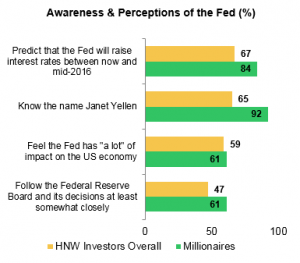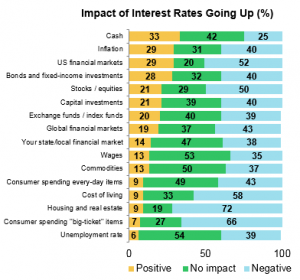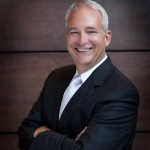Widgetized Section
Go to Admin » Appearance » Widgets » and move Gabfire Widget: Social into that MastheadOverlay zone
Denver investors expect eventual rate hike, yet no consensus on whether a hike will be a good thing
Denver Investor Sentiment: Part 2 – Interest rates
The Fed has announced in its September Federal Open Market Committee (FOMC) meeting that it will maintain a zero-interest rate policy, but plan to raise rates at some point this year.[1] This comes as no surprise to Denver-area high net worth (HNW) investors, as reported by recent findings from the Morgan Stanley Investor Pulse Poll of 1,003 US HNW investors ages 25 to 75 with $100,000 or more in investable household financial assets. The poll included 300 HNW investors in the Denver Metro Market.
 Six in 10 (59%) of HNW investors feel that the Federal Reserve Board
Six in 10 (59%) of HNW investors feel that the Federal Reserve Board
and its decisions impact the performance of the US economy “a lot.” Another 48% say the Fed has a “major” effect on their investment decisions.
Nearly half (47%) report following the Fed and its decisions at least somewhat closely. And two in three (65%) are aware of Janet Yellen. Of those who know the name, 39% approve of the job she’s doing as Fed Chair. However, even more (45%) neither approve nor disapprove or are unsure (9%), suggesting somewhat of a lack of familiarity.
When it comes to interest rates, two in three (67%) expect the Federal Reserve to raise interest rates between now and mid-2016. Of those who predict a rise in interest rates, most expect an increase of either 0.5% (30%) or 0.25% (27%), while one in 10 (11%) are unsure.
HNW investors overall are somewhat split on how large of an increase will be acceptable: 39% say either 0.25% or 0.50% and 46% say 0.75% or more; 16% are not sure. There is also no clear consensus on whether it is a good or bad idea to raise rates: 32% say good, 32% say bad, 22% say neither and 14% are not sure.
Ahead of a possible raising of interest rates, some HNW investors have taken, or are considering taking, a number of steps: paying off consumer debt (e.g., credit cards) (27%), buying real estate investments (16%), investing more money in bonds or bond funds (13%), and buying a car or other consumer discretionary goods (12%).
Rising Interest Rates Seen to Negatively Impact Housing Industry, Big-Ticket Consumer Spending and Cost of Living, Among Others
 Denver-area HNW investors tend to view higher interest rates as impacting many economic indicators in the negative direction. Half or more foresee a negative impact on housing and real estate (72%), consumer spending on “big-ticket” items (66%), cost of living (58%), the US financial markets (52%), and stocks and equities (50%). Roughly four in 10 say the same of global financial markets (43%), consumer spending on every-day items (43%), inflation (40%), and bonds and fixed-income investments (40%)—though sizable shares believe that rising interest rates would have no impact on each of these measures.
Denver-area HNW investors tend to view higher interest rates as impacting many economic indicators in the negative direction. Half or more foresee a negative impact on housing and real estate (72%), consumer spending on “big-ticket” items (66%), cost of living (58%), the US financial markets (52%), and stocks and equities (50%). Roughly four in 10 say the same of global financial markets (43%), consumer spending on every-day items (43%), inflation (40%), and bonds and fixed-income investments (40%)—though sizable shares believe that rising interest rates would have no impact on each of these measures.
HNW investors are evenly split on whether rising interest rates would have a negative or no impact on capital investments and exchange or index funds. The remaining items are viewed as more stable in the face of interest rate changes, with majorities or pluralities selecting “no impact.”
Relatedly, two in three (66%) HNW investors overall report at least some concern that current interest rates are creating a “consumer assets bubble.” However, few are “very concerned” (15%).
Always remember to avoid making kneejerk changes to your portfolio and to reevaluate your overall allocation. Consider speaking to your financial advisor so you can grasp a full picture of what to expect in the event of a rate hike.
Stephen Stribling is a Financial Advisor with the Pelican Bay Group, Global Wealth Management Division of Morgan Stanley in Denver. He can be reached at 303-572-4889 or stephen.l.stribling@ms.com.
The information contained in this interview is not a solicitation to purchase or sell investments. Any information presented is general in nature and not intended to provide individually tailored investment advice. The strategies and/or investments referenced may not be suitable for all investors as the appropriateness of a particular investment or strategy will depend on an investor’s individual circumstances and objectives. Investing involves risks and there is always the potential of losing money when you invest. . Morgan Stanley and its Financial Advisors do not provide tax or legal advice. Individuals should seek advice based on their particular circumstances from an independent tax advisor. Information contained herein has been obtained from sources considered to be reliable, but we do not guarantee their accuracy or completeness. The views expressed herein are those of the author and may not necessarily reflect the views of Morgan Stanley Wealth Management, or its affiliates. Morgan Stanley Smith Barney LLC. Member SIPC.
[1] http://www.nytimes.com/2015/09/18/business/economy/fed-leaves-interest-rates-unchanged.html
Stephen Stribling
Latest posts by Stephen Stribling (see all)
- How are 2017 holiday sales faring so far? Merry and bright! - December 23, 2017
- October is Financial Planning Month: A great time to evaluate your finances - October 26, 2017
- Investing for the future of the auto industry: autonomous mobility - February 24, 2017



